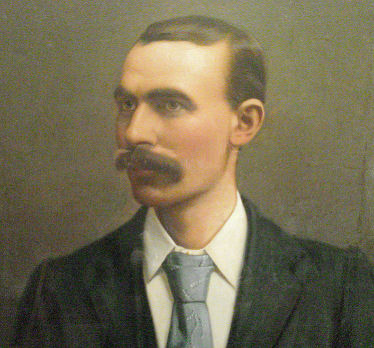Hugh Caldwell - Local Poet

Pictures supplied by Alan McVean
Hugh Caldwell was a local poet who died in 1903. His work, mostly written about local places and events, is humble, observant and humourous.
Like his contemporary, Katherine Drain, he is not really celebrated in this area as he should be. His works convey an accurate and honest appreciation of what life was like in the Vale of Leven of the late 1800s. It is not that these local poets are ignored, it's just that few people are aware of them or their works.
Through this website we are delighted to be able to share his works with the world.
A book of Caldwell's poetry was published in 1903, after his death. In the preface to the book J. Cromarty Smith, who appears to have been responsible for getting the works published, wrote the following.
(Note that the book download was scanned from the original using an OCR scanner, which converts textual images to print. It is not always 100% accurate so there may be some errors in there. Feel free to point these out and we will correct them.)
The author of these verses would have been the very last to claim for them any literary merit. Some of them were written to amuse his own leisure hours, and others to entertain his friends. A few of them appeared from time to time in "The Lennox Herald" and other local papers, while one or two reached a larger circle of readers in the columns of the "People's Friend."
They are now published in this form in compliance with the wishes of many of his acquaintances; and if no other purpose be served, the booklet will help to keep green the remembrance of one of the most loyal hearted and manliest Christian fellows that the writer of this little preface has been privileged to know.
But though these verses make no pretence to rank as poetry in the true sense of the term, it will be at once allowed by the reader who has the poetic taste that many of them show a felicity of expression that not every versifier possesses, and a power of seeing into and interpreting the great realities that is given only to those who have a share of the poetic soul.
It is unnecessary to specify, but the lines on "A Little Songster" on page 60, and those addressed to "A Little Bird" on page 45, will bear out what is said. That our versifier had a genuine strain of wholesome humour will be readily concluded by any who take the trouble to turn to pieces such as "The Man in the Moon" on page 78, or the "Power of Liquid Air" on page 83.
Another feature is worthy of special notice: It is the power of keen insight into and appreciation of the life and ways of the working-class, among whom his lot in life was cast. He knew by experience the hardships and difficulties of his fellow toilers, but was able to see how amid these the true purpose of life may be reached, and how a brave heart can make music to itself in spite of the monotony of the daily task. The reader is referred for evidence of this to such pieces as "Hogmanay" on page 56, or "The Dying Shipbuilder" on page 94, and many others.
It was the brave heart and happy spirit set forth in these pieces that endeared him living to many friends and that will always be associated with his memory now that he is gone.
For he is gone! —cut down in the prime of his manhood by a cruel malady that made his last days on earth days of torture. The pathetic circumstances in which the last lines of this book were composed will sufficiently explain themselves. The few who watched by him during the days after his return from the Edinburgh Royal Infirmary will never forget the resolute Christian courage with which he endured his extremity of long-continued agony. He had long before learned from "Him who bore our griefs and carried our sorrows" the royal secret how to suffer and be strong; and many a time in those hours of racking pain the happy smile he bore told of the peace within " which passeth all understanding."
And it is this, now that he is passed to his rest, that will commend these verses to all who understand the value for this world of a brave, though humble, Christian life.
J. CROMARTY SMITH.
Alexandria, Dumbartonshire,
19th December, 1903.


